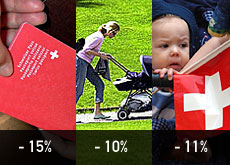Swiss keep citizenship out of easy reach

Swiss voters have thrown out parliament-backed proposals to make it easier for young foreigners to become citizens, in nationwide ballots on Sunday.
But they did approve statutory maternity benefits for working women. Another ballot, on slowing reforms to the state-owned Post Office, failed to pass.
Working women were the only winners in Sunday’s votes. The Swiss finally decided to introduce statutory maternity benefits after throwing out similar proposals on three occasions in the past.
But voters sided with the rightwing Swiss People’s Party on the issue of citizenship, rejecting two proposals which would have made it easier for young foreigners to become Swiss.
The first sought to speed up the naturalisation procedure for people aged 14 to 24. It was rejected by almost 57 per cent. Another, which sought to grant automatic citizenship to children born in Switzerland of foreign parents, was voted down by 51.6 per cent.
The country was heavily split along linguistic lines, with French-speaking voters supporting all the proposals, while German-speakers tossed out all except maternity benefits, which passed with 55.4 per cent of the vote.
High turnout
Voter participation was higher than usual, with about 56 per cent turning out to have their say compared with the usual 45 per cent.
Opponents of the citizenship proposals, led by the rightwing Swiss People’s Party, had argued that they would undervalue Swiss citizenship. In the run-up to the vote, the party ran controversial newspaper advertisements warning that Muslims would eventually become a majority in Switzerland, and could introduce Sharia law.
The proposal also foresaw standardising the regular citizenship procedure across the country. This would have reduced the minimum residency period required before one can apply for citizenship and set maximum fees for citizenship applications.
Burden
On maternity benefits, the Right argued that they would pose an unacceptable burden on employers, but this failed to persuade the voters.
The outcome means that working women will be eligible for 14 weeks’ paid maternity leave. Until now it was up to individual employers to decide whether to pay maternity benefits, although the principle was enshrined in the Swiss constitution more than 50 years ago.
Many large private companies and employers in the public sector have long had maternity leave schemes.
Closure
A third issue – slowing the restructuring of the state-owned Post Office – also failed to pass, with 50.2 per cent voting against. Supporters were seeking to prevent the planned closure of 800 post offices nationwide.
The voters evidently believed the Post Office’s assures that, despite the cuts, it would continue to keep up a nationwide post office network, notably in remote mountain regions.
swissinfo
The vote was split along linguistic lines, with French-speakers supporting all four proposals.
German-speakers rejected both citizenship votes, but narrowly voted in favour of maternity benefits.
Voter participation was higher than usual, with about 56 per cent turning out to have their say compared with the usual 45 per cent.
Two votes on easing citizenship restrictions for young foreigners were thrown out by 56.8% and 51.6%.
55.4% of voters approved statutory maternity benefits for working women.
50.2% rejected plans to prevent closure of 800 post offices.

In compliance with the JTI standards
More: SWI swissinfo.ch certified by the Journalism Trust Initiative




You can find an overview of ongoing debates with our journalists here. Please join us!
If you want to start a conversation about a topic raised in this article or want to report factual errors, email us at english@swissinfo.ch.